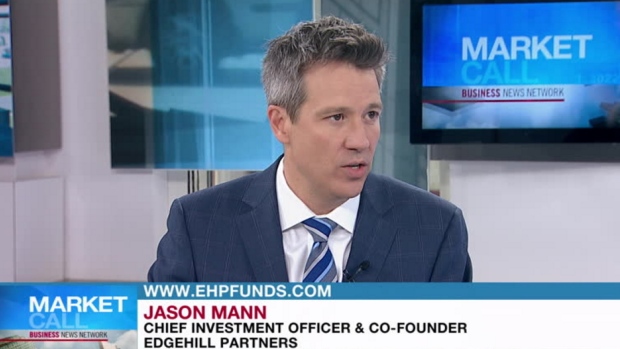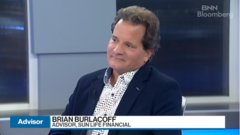Jun 28, 2017
Jason Mann's Top Picks: June 28, 2017
BNN Bloomberg

Jason Mann, chief investment officer and co-founder at EdgeHill Partners
Focus: North American equities
_______________________________________________________________
MARKET OUTLOOK
We had been optimistic that the “value trade” (buying cheaper cyclical stocks that benefit from rising rates and broad-based economic growth), which accelerated after the U.S. election, would have further to run as the economy accelerated and inflation picked up.
The value trade (aka the “Trump trade”) has hit stall speed, however, having peaked in December of last year and falling steadily since then. We can see the effect in financials, resource stocks, small caps, and Canadian stocks in general. Inflation expectations are falling again, and the yield curve is flattening.
Growth stocks have once again become investor favourites. Growth stocks do well when overall economic growth is scarce and investors pay a premium to invest in the handful of stocks that are growing sales. The FANG stocks best exemplify this recent trend.
The problem is that the market is already expensive, and these growth stocks even more so. You can’t stand in front of a freight train, but growth outperforming like this is typical of late-cycle markets. We aren’t there yet, but the best analogies are 1990, 1999, 2007 and 2011 — all periods that preceded meaningful market weakness.
In the long-run, investors consistently overpay for growth stocks, and a strategy that favours them underperforms. But there can be shorter periods where the growth style dominates all others, and that has been true over the last few months.
We’ve become much less constructive on the Canadian market. Our process dictates that as market trends roll-over, we decrease our risk — and this happened in Canada a few weeks ago for the first time in more than a year.
The positives are that the U.S. market remains strong and Europe is growing again. U.S. high-yield debt — the riskiest part of the bond market — is also at all-time highs, despite the weakness in energy. Is Canada just an outlier? We’ll remain cautious until proven otherwise.
TOP PICKS
GENWORTH FINANCIAL (MIC.TO)
- Genworth is a mortgage reinsurer — an industry that has become very topical in recent months with the volatility in the Canadian housing market and the events at Home Capital.
- Recent earnings have been driven in part by low loss ratios, but the concern now is that perhaps a larger number of mortgages in Canada may actually be based on fraudulent information from the borrowers, and that we may be at the top of a housing bubble. While borrowers may be able to pay these mortgages today, if unemployment spikes or interest rates move higher, they may not be able to pay them in the future.
- If in fact mortgages were fraudulently originated at mortgage providers, Genworth has the ability to refuse the insurance coverage, so there is a measure of protection for Genworth.
- Further, Genworth doesn’t insure sub-prime/Alt-A mortgages like those at Home Capital where there has been speculation of more wide-spread fraud. MIC insures only prime mortgages where borrowers have average credit score of 750.
- They don’t fund their business with short-term deposits but rather with upfront insurance premiums, so there is not the same “run on the bank” risk that hurt Home Capital.
- They are at risk for government policy changes: Greater down payment regulations, lender capital ratios, etc. All of these could reduce underwriting volumes for them in the future.
- Valuation is compelling in large part because of these concerns. We think you are more than compensated for the risk at 6.4x P/FCF, 0.8x price-to-book, 8.3x PE, double-digit ROEs, and a yield of 4.8 per cent. Scores in the top three per cent of Canadian stocks in terms of valuation.
- Price momentum had been struggling as the Home Capital saga played out, but with Buffett moving to shore up HCG the sector has had an injection of confidence, and price momentum has improved materially.
COGECO COMMUNICATIONS (CCA.TO)
- Cable TV/Internet/phone provider (but not wireless).
- Cable peers have done well recently; CCA is no exception trading at all-time highs.
- So it has strong price momentum; it ranks in the top 15 per cent of all Canadian stocks by this measure.
- Also is in the top 15 per cent of all stocks on a valuation basis: 6.4x EV/EBITDA, 8.7x P/FCF, 14x PE, 16.8 per cent ROE. Materially cheaper than Rogers and Shaw on PE measure with those peers trading closer to 21-23x earnings.
- Carries a fair bit of debt which is typical of cable operators, but given the stability of their business they maximize shareholder returns with a fairly high debt ratio.
- Rogers owns 31 per cent of CCA and has a “blocking” position. As such, they are the logical buyer if the Audet family ever wants to sell. That said, they have been acquirers themselves, buying U.S. independent cable operators over the past number of years.
- In a market where we are becoming increasingly concerned, owning a stock like CCA, while “low growth,” can provide some stability to a portfolio.
SHORT: FIRST QUANTUM MINERALS (FM.TO)
- Base metals producer with assets in Africa and large development assets in Panama
- We had been long base metals stocks for a good part of 2016, but the trade has faded along with other cyclical value stocks in 2017.
- FM has rolled over from a price momentum perspective and now scores in the bottom 10 per cent on that measure.
- At the same time, their valuation is not at all cheap. Trades at 12x trailing EV/EBITDA, 43x PE, 1.4 per cent ROE. They carry a lot of debt, partly as a result of their acquisition of Inmet back in 2013, and partly as they build out the huge Cobre Panama mine (50 per cent complete). Scores in the bottom 10 per cent of all Canadian stocks in terms of valuation and volatility.
- A short like this can be dangerous on a stand-alone basis, but used as part of a portfolio of overvalued, declining shorts, it can be used to reduce the volatility of a long portfolio.
- These types of stocks are exactly the ones we are concerned about if the reflation trade has truly come to an end. With their high debt levels, a small decline in the enterprise value translates into a large decline in the stock. These types of stocks are called “cyclicals” for a reason, and the risk that we are at the end of the cycle is increasing.
| DISCLOSURE | PERSONAL | FAMILY | PORTFOLIO/FUND |
|---|---|---|---|
| MIC | Y | Y | Y |
| CCA | N | N | Y |
| FM | N | N | Y |
PAST PICKS: JUNE 3, 2016
WESTJET AIRLINES (WJA.TO)
- Then: $23.07
- Now: $23.12
- Return: +0.21%
- TR: +3.34%
MANULIFE FINANCIAL (MFC.TO)
- Then: $19.04
- Now: $23.94
- Return: +25.73%
- TR: +30.30%
WAL-MART (WMT.N)
- Then: $70.87
- Now: $76.52
- Return: +7.97%
- TR: +11.00%
TOTAL RETURN AVERAGE: +14.88%
| DISCLOSURE | PERSONAL | FAMILY | PORTFOLIO/FUND |
|---|---|---|---|
| WJA | N | N | N |
| MFC | N | N | N |
| WMT | N | N | Y |
FUND PROFILE: EHP SELECT FUND
PERFORMANCE AS OF JUNE 16, 2017:
- 1 month: Fund* +4.4%, Index** -1.5%
- 1 year: Fund* +11.2%, Index** +12.6%
- Since inception (Nov. 2014): Fund* +14.2%, Index** +12.4%
* Returns include reinvested dividends
** Index: S&P TSX Total Return
TOP HOLDINGS AND WEIGHTINGS
- BRP Inc/CA: 6.3%
- Canadian National Railway Co: 5.8%
- West Fraser Timber Co Ltd: 5.1%
- Interfor Corp: 5.1%
- Dollarama Inc: 4.9%
WEBSITE: www.ehpfunds.com












